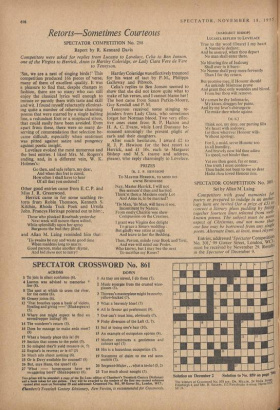Retorts—Sometimes Courteous
Competitors were asked for replies from Lucasta to Lovelace. Celia to Ben Jonson, one of the Virgins to Herrick, Anon to Hartley Coleridge, or Lady Clara Vere de Vere to Tennyson.
'SIR, we are a nest of singing birds!' This competition produced 166 pieces of verse, many of them of excellent quality. It was a pleasure to find that, despite changes in fashion, there are so many who can still enjoy the classical lyrics well enough to imitate or parody them with taste and skill and wit. I found myself reluctantly eliminat- ing quite a number of otherwise charming poem that were marred by a single halting line, a redundant foot or a misplaced stress, that could easily have been avoided. Even apart from these, there were so many de- serving of commendation that selection be- came difficult, especially when sentiment was pitted against satire and pungency against poetic insight.
Lovelace evoked the most numerous and the best entries. 1 liked Mrs. M. Rogers's ending, and, in a different vein, W. K. Holmes's Go then, and safe return, my dear,
And when this fret is cured, How often I shall have to hear
Of all that you endured!
Other good entries came from E. C. P. and Miss J. R. Greenwood.
Herrick came in for some scathing re- torts from Robin Thomson, Kenneth S. Kitchin, Rhoda Tuck Pook and Ursula John. Francys Heritage pointed out to him :,
Those who plucked Rosebuds yesterday Next week will mourn them wilted. While splendidly upon her spray
Burgeons the bud they jilted.
and Allan M. Laing reminded him that : 'Tis swains be coy and waste good time
When maidens long to marry. Good parson, make another rhyme.
And bid them not to tarry ! Hartley Coleridge was effectively trounced for his want of tact by P. M., Philippa Galloway and Pibwob.
Celia's replies to Ben Jonson seemed to show that she did not know quite what to make of his verses, and I cannot blame her ! The best came from Susan Parkin-Moore, Guy Kendall and P. M.
Tennyson received some stinging re- joinders from Lady Clara; who sometimes forgot her Norman blood. Two very effec- tive ones came from 13. P. Hatton and 14. A. C. Evans, while lord Dunsany be- moaned amusingly the present plight of . earls and their daughters.
After much hesitation. I award £2 to R. I. P. Hewison for the best retort to
Herrick, and 10s, each to Margaret Bishop and M. S. (name and address, please), who reply charmingly to Lovelace.
PRIZES (R. 1. P. HEWISON) To MASTER HERRICK, TO MIND I I IS OWNE BUSINESSE
Nay, Master Herrick, I will not
Bee sermon'd thus and harried. Think'st thou a Maidens onely Lot
And Aime is, to be married?
'Tis Man, 'tis Man, will have it sot, Incontinent by Nature.
From onely Charitie wee shew Compassion on the Creature.
1 grant wee Virgins doe delight To grace a Sisters wedding: But gladly wee retire at night
And leave to her the Bedding.
Then, Parson, minde your Book and Text, And wee will mind our Posies. Who knows, but I may bee the next To sacrifice my Roses?
. (MARGARET IIISHOP)
LUCASTA REPLIES TO LOVELACE
True to thy word (Deare) I my heart A Nunnerie declare; And be assured, when thou depart No man shall enter there.
No blistring fire of Jealousy Shall ever in it burn : No Nunne shall pray more fervently Than I for thy return.
But promise nice, if. Honour should An unkinde Mistresse prove And grant thee only woundes and blood.
From her thou wilt remove.
My armes be thy Infirmarie, My kisses, drugges for paine, And by my love's chirurgerie i'le make thee whole againe.
Think not, my dere, our parting fills My heart with jealousy, Go thou wherever Honour wills Without apology.
For I, a maid, serve Honour too In all humility,
And bravely now bid thee adieu To speed, not hinder thee.
Yet ere thou goest, far or near, One truth 1 must confess— Thou hadst not been to me so dear Hadst thou loved Honour less.










































































 Previous page
Previous page